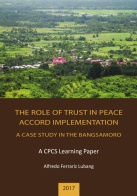 The Role of Trust in Peace Accord Implementation: A Case Study in the Bangsamoro
The Role of Trust in Peace Accord Implementation: A Case Study in the Bangsamoro
Author: Alfredo Ferrariz Lubang
Published by: CPCS
Publication Date: February 2017
ISBN: N/A
Originally conducted as an Action Research project for CPCS’ Applied Conflict Transformation Studies Master’s Programme, this publication explores the role of trust in implementing peace accords. Utilising the case of the peace process between the Moro Islamic Liberation Front (MILF) and the Government of the Philippines (GPH), the publication unpacks the concept of trust and how it can be nurtured. Considering trust from a societal approach, the publication seeks to answer the following three questions: 1) How do people define trust within the context of implementing a peace accord; 2) What are the important factors of trust in implementing a peace accord; and 3) What factors diminish trust during the implementation period.Through an analysis of a community survey, the research emphasises that trust plays an integral role in the successful implementation of a peace accord. Concluding that trust is a reflexive process in which individuals process trust through their own experiences and in turn share them with their community, the publication suggests that trust creates space for understanding and flexibility between parties, thereby enhancing the chance for peace to take root. Importantly, it also provides recommendations for stakeholders at various levels, including leaders of the MILF and GPH, implementers of the peace accords, and community residents, in order to better support the implementation of the peace process.
